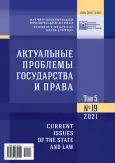The importance of legal positions of international and domestic judicial authorities for preventing secession: theoretical historical aspect
- Authors: Khashchina E.E.1
-
Affiliations:
- Kursk State University
- Issue: Vol 5, No 19 (2021)
- Pages: 438-453
- Section: General Theory and History of Law and the State
- URL: https://journal-vniispk.ru/2587-9340/article/view/303897
- ID: 303897
Cite item
Abstract
The legal regulation of secession – the unilateral withdrawal of a part of territory from the parent state, is carried out at the junction of two branches of law – international and constitutional. Due to the absence in most of written constitutions of norms directly related to secession, and the laconic nature of relevant principles of international law, allowing for the possibility of ambiguous interpretation, decisions of international and domestic judicial authorities on the admissibility of secession play a special role in the legal mechanisms for its prevention, which determines the relevance of the chosen themes. Based on the analysis of the Advisory Opinion of the International Court of Justice of the United Nations of July 22, 2010 “On compliance with international law of the unilateral declaration of independence of Kosovo”, we formulate a conclusion about the absence of uniform international legal criteria to determine the admissibility of secession. In our opinion, the International Court of Justice has not resolved the legal issue underlying the protracted political conflict, has not created a new norm of customary international law, but has not provided the supporters of the unilateral declaration of independence with the necessary and sufficient arguments for the legal justification of their position. This allows us to speak about the importance of this decision in the international legal mechanisms for the prevention of secession, which, however, are at the stage of formation. Their development should take place synchronously with the constitutional and legal intrastate mechanisms, which in modern conditions should be aimed at finding a balance between the interests of the center and regional communities, establishing a dialogue with supporters of independence and protecting the national and cultural identity of population.
About the authors
Ellina E. Khashchina
Kursk State University
Author for correspondence.
Email: ellenberns1408@gmail.com
ORCID iD: 0000-0001-5188-4377
Candidate of Law, Associate Professor of Constitutional and Administrative Law Department
Russian Federation, 33 Radishcheva St., Kursk 305000, Russian FederationReferences
- Andreyeva G.N. Konstitutsionno-pravovaya doktrina po voprosam setsessii v stranakh – chlenakh ES (na primere Ispanii, Germanii, Italii, Velikobritanii) [Constitutional legal doctrine on the issues of secession in the EU member states (case study of Spain, Germany, Italy, UK)]. Lex russica (Russkiy zakon) – Lex russica (The Russian Law), 2018, no. 8, pp. 130-143. (In Russian).
- Gartsl B. Otkrytiye yashchika Pandory, ili kak pravo na samoopredeleniye razzhigayet obmanchivyye strasti (nekotoryye mezhdunarodno-pravovyye aspekty nezavisimosti Kosova) [Opening up of a Pandora’s box or how the right to self-determination inflames deceptive passions (some international legal aspects of Kosov’s independence)]. Trudy Instituta gosudarstva i prava RAN – Proceedings of the Institute of State and Law of the RAS, 2018, no. 5, pp. 92-116. (In Russian).
- Aleksanyan S.R. K voprosu o teorii remedial’noy setsessii v sovremennom mezhdunarodnom prave [On theory of remedial secession in contemporary international law]. Moskovskiy zhurnal mezhdunarodnogo prava – Moscow Journal of International Law, 2017, no. 4, pp. 141-150. https://doi.org/10.24833/0869-0049-2017-4-141-150. (In Russian).
Supplementary files








